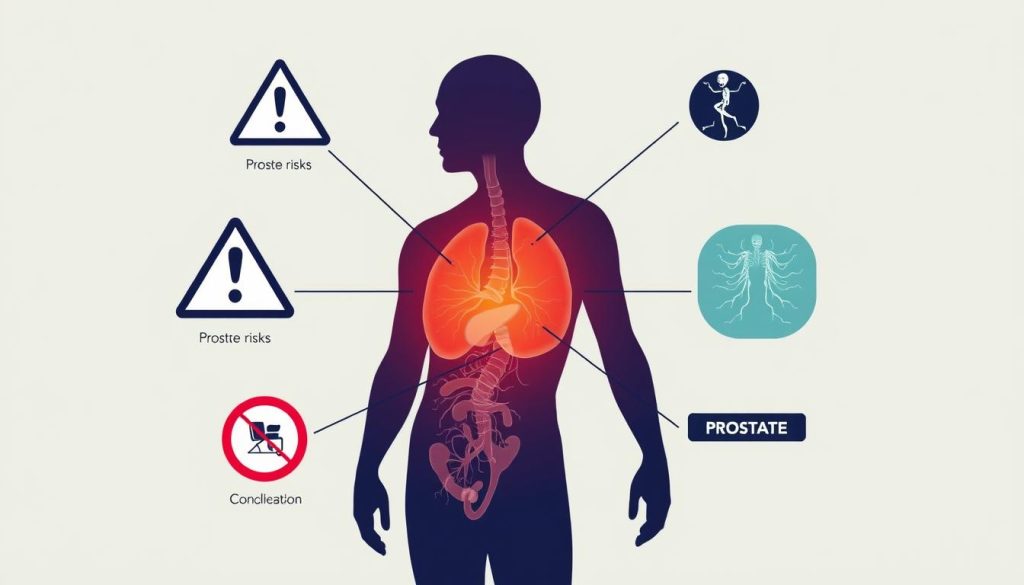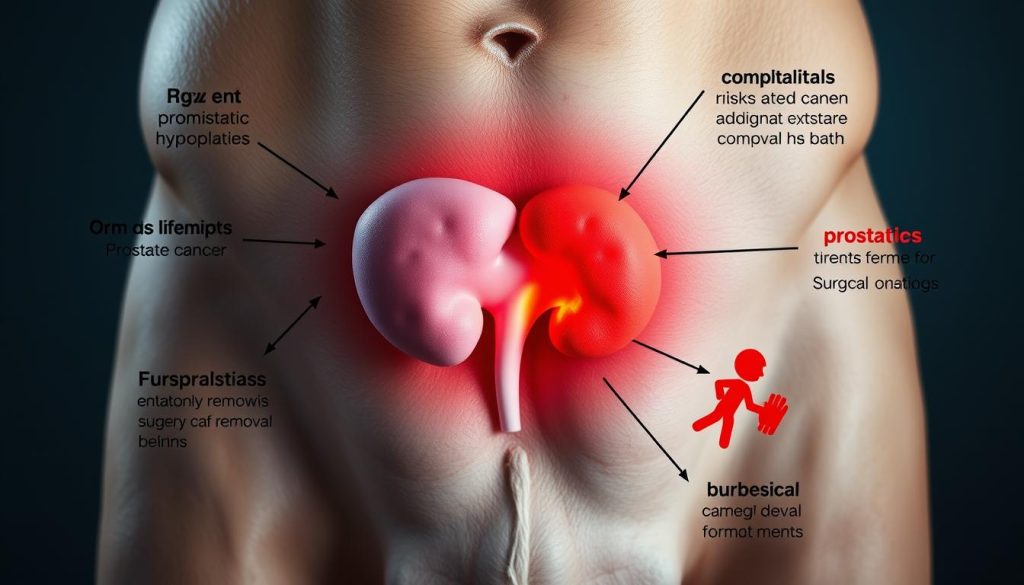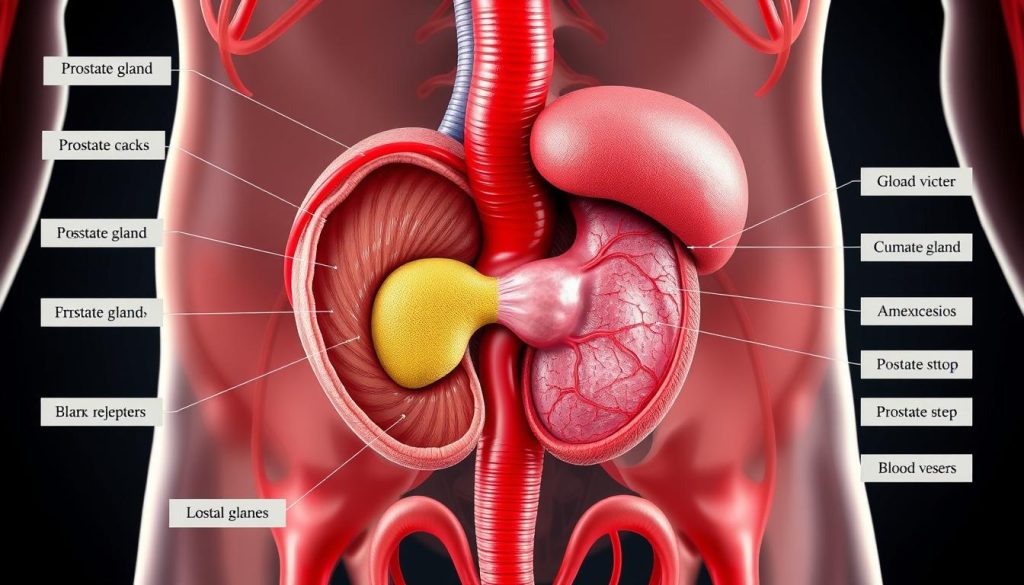When we think about removing the prostate gland, cancer is usually the first thing that comes to mind. But, prostate removal isn’t just for cancer. The choice to have prostate cancer surgery depends on many factors and risks.
Doctors might suggest removing the prostate for other health problems too. Knowing all the reasons for prostate removal helps men make better health choices. Let’s look into the details of prostate health and when surgery might be needed, not just for cancer.
Understanding the Prostate Gland and Its Essential Functions
The prostate gland is key to male health. It’s about the size of a walnut and sits below the bladder. It’s around the urethra, making it vital for both reproductive and urinary functions.
Anatomical Location and Size of the Prostate
The prostate gland is deep in the pelvis, between the rectum and pubic bone. It grows with age, sometimes causing urinary problems.
Role in Male Reproductive Health
The prostate gland is crucial for reproduction. It makes a fluid that nourishes and protects sperm. This fluid is about 30% of semen, helping sperm survive and move well.
The gland also helps push semen out during ejaculation.
Impact on Urinary Function
The prostate’s position around the urethra can affect urination. As men age, it often grows, causing urinary issues. These can include:
- Frequent urination, especially at night
- Weak urine stream
- Difficulty starting or stopping urination
- Incomplete bladder emptying
Knowing how the prostate works helps understand its importance. It also explains why surgery might be needed in some cases, like other gender-specific cancers.
Is Cancer The Only Reason For Removing Prostate Gland
Prostate cancer is a common reason for removing the prostate gland. But, it’s not the only reason. Doctors look at many factors before suggesting surgery. Knowing these reasons helps patients make better health choices.

Benign prostatic hyperplasia (BPH) is another reason for surgery. This non-cancerous growth can cause serious urinary issues. Sometimes, medicine and lifestyle changes aren’t enough, leading to surgery.
Chronic prostatitis, or long-lasting prostate inflammation, might also need surgery. Rarely, prostate abscesses or severe injuries to the area could require it too.
“Prostate removal is a complex decision that involves weighing the potential benefits against the risks. It’s crucial for patients to discuss all options with their healthcare provider.”
Prostate removal risks include:
- Urinary incontinence
- Erectile dysfunction
- Infertility
- Changes in orgasm sensation
- Potential complications from surgery
| Condition | Likelihood of Requiring Prostate Removal |
|---|---|
| Prostate Cancer | High (depending on stage and grade) |
| Severe BPH | Moderate to High |
| Chronic Prostatitis | Low to Moderate |
| Prostate Abscess | Low |
While cancer is a main reason for prostate removal, other conditions can also lead to surgery. Patients should talk to their doctors about all treatment options before deciding on surgery.
Benign Prostatic Hyperplasia (BPH) as a Major Cause for Prostatectomy
Benign prostatic hyperplasia, or BPH, is a common issue that causes the prostate to grow. This non-cancerous growth is common in older men. It often leads to the need for a prostatectomy.
Symptoms and Progression of BPH
The symptoms of BPH start off mild but get worse over time. Men may notice:
- Frequent urination, especially at night
- Weak urine stream
- Difficulty starting urination
- Inability to empty the bladder completely
As the prostate grows, these symptoms can really affect a man’s quality of life.
Treatment Options Before Surgery
Before surgery, doctors often suggest non-surgical treatments:
| Treatment Type | Examples | Effectiveness |
|---|---|---|
| Medications | Alpha-blockers, 5-alpha reductase inhibitors | Moderate |
| Lifestyle changes | Reducing fluid intake before bed, avoiding caffeine | Mild to moderate |
| Minimally invasive procedures | Transurethral needle ablation, microwave therapy | Moderate to high |
When BPH Requires Surgical Intervention
Prostatectomy is needed when BPH causes severe problems or doesn’t get better with other treatments. Surgery is considered when there are:
- Recurrent urinary tract infections
- Bladder stones
- Kidney damage
- Complete urinary retention
In these serious cases, surgery to remove the enlarged prostate can greatly help. It can also prevent more serious problems.
Medical Conditions Leading to Prostate Removal
Prostate removal isn’t just for cancer. Many other health issues can also lead to this surgery. Knowing about these conditions helps patients make better health choices.

Recurrent prostatitis, or ongoing prostate inflammation, might need surgery. It causes pain and makes it hard to urinate, affecting life quality. If other treatments don’t work, removing the prostate might be an option.
Prostatic abscesses are rare but serious. These infections in the prostate can cause big health problems if not treated. Sometimes, surgery is needed to drain the abscess or remove the prostate to avoid more issues.
Some medicines or treatments can also harm the prostate. For example, hormone therapy for cancer can make the prostate bigger, leading to urinary issues. If these problems are severe, removing the prostate might be considered.
| Condition | Symptoms | Treatment Options | When Surgery Considered |
|---|---|---|---|
| Recurrent Prostatitis | Pain, urinary issues | Antibiotics, pain management | Persistent symptoms, failed treatments |
| Prostatic Abscess | Fever, pain, difficulty urinating | Antibiotics, drainage | Large abscesses, multiple occurrences |
| Medication Side Effects | Enlarged prostate, urinary problems | Medication adjustment | Severe, persistent symptoms |
While these conditions might lead to prostate removal, it’s important to consider the risks. Problems like urinary issues can happen after surgery. Talking to a urologist is key before making this big decision.
Types of Prostate Surgery and Modern Techniques
Prostate cancer surgery has changed a lot over time. Today, doctors have many ways to do a prostatectomy. Each method has its own good points and possible downsides.
Robotic-Assisted Prostatectomy
This advanced method uses robotic arms that a surgeon controls. It allows for very precise movements and 3D views. This surgery often means less blood loss and a quicker recovery. Many patients get to go home sooner than with older methods.
Traditional Open Surgery Methods
Open prostatectomy needs a big cut in the belly. It gives the surgeon direct access to the prostate. But, it usually means a longer time to get better. This method might be needed for harder cases or when robots aren’t available.
Minimally Invasive Procedures
Laparoscopic prostatectomy uses small cuts and special tools. It can lead to less pain and faster healing. But, it needs a lot of skill from the surgeon and might not work for everyone.
| Surgical Technique | Recovery Time | Incision Size |
|---|---|---|
| Robotic-Assisted | 1-2 weeks | 5-6 small incisions |
| Open Surgery | 4-6 weeks | One 4-5 inch incision |
| Laparoscopic | 2-3 weeks | 4-5 small incisions |
Choosing the best prostate surgery depends on many things. These include the cancer’s stage, your health, and the surgeon’s skills. It’s important to talk to your doctor about the risks and benefits of each option. This way, you can make a choice that’s right for you.
Post-Surgery Recovery and Quality of Life Considerations
Recovering from prostate removal surgery affects many parts of life. Patients often deal with urinary issues and changes in how their prostate works. Knowing these challenges helps set realistic goals and plan for a better recovery.
Many men struggle with controlling their bladder after surgery. This can last for weeks or months. Exercises and bladder training help regain control. Urologists can offer specialized care to improve and speed up recovery.
Erectile dysfunction is another issue for many. Surgery can harm nerves needed for erections, causing problems. Treatments include medicines, vacuum devices, and implants. Talking openly with doctors is crucial for these sensitive topics.
“Recovery is a process, not a race. Each patient’s journey is unique, and it’s important to focus on progress rather than perfection.”
After surgery, lifestyle changes are often needed. This includes eating differently, being more active, and managing stress. Support groups and counseling offer emotional support and practical tips for this new chapter.
| Recovery Aspect | Common Challenges | Management Strategies |
|---|---|---|
| Urinary Function | Incontinence, frequent urination | Pelvic floor exercises, bladder training |
| Sexual Health | Erectile dysfunction, reduced libido | Medication, devices, therapy |
| Emotional Well-being | Anxiety, depression | Counseling, support groups |
| Physical Activity | Limited mobility, fatigue | Gradual exercise, physiotherapy |
By tackling these areas fully, patients can improve their life quality after surgery. Recovery needs patience, effort, and a strong support network.
Making an Informed Decision: When to Consider Prostate Removal
Choosing to remove your prostate is a big decision. It’s important to know all the facts before you decide. Not all prostate removals are for cancer. Sometimes, it’s needed for benign prostatic hyperplasia.
Your doctor will help you understand the risks and benefits. They will consider your health and what’s best for you. This way, you can make a choice that fits your situation.
Seek advice from experts like urologists and oncologists. They can explain your options clearly. They’ll also run tests to help you decide.
Don’t rush into a decision. Getting a second opinion is a good idea if you’re unsure. Learn about all the treatments available. Some men find relief with medication or lifestyle changes. Others might need surgery.
Your health team will guide you through each step. They will help you choose the best option for your health.
FAQ
Q: Is cancer the only reason for removing the prostate gland?
A: No, cancer isn’t the only reason for removing the prostate. Other issues like benign prostatic hyperplasia (BPH), recurrent prostatitis, and prostatic abscesses can also require surgery.
Q: What are the main functions of the prostate gland?
A: The prostate gland is key for male health and urine flow. It makes seminal fluid to help sperm, aids in ejaculation, and controls urine flow.
Q: How does benign prostatic hyperplasia (BPH) lead to prostate removal?
A: BPH can cause severe urinary problems. If other treatments don’t work, surgery might be needed. This is because the enlarged prostate can block urine flow, leading to infections or stones.
Q: What are the different types of prostate removal surgery?
A: There are several types of prostate removal surgery. These include robotic-assisted, traditional open surgery, and minimally invasive procedures. Each has its own benefits and risks, which a urologist can help you understand.
Q: What are the potential risks of prostate removal?
A: Risks include urinary incontinence, erectile dysfunction, bleeding, infection, and changes in orgasm. The severity of these risks depends on the surgery type and individual factors.
Q: How long is the recovery period after prostate removal surgery?
A: Recovery time varies, but most need 4-6 weeks to start feeling better. It can take months to a year for full recovery, including regaining urinary and sexual function. Rehabilitation and support are key during this time.
Q: Can prostate removal affect fertility?
A: Yes, it usually makes men infertile. This is because the surgery removes the prostate and seminal vesicles, which are vital for semen production. Men wanting to have children should talk to their doctor about sperm banking before surgery.
Q: Are there alternatives to prostate removal for conditions like BPH?
A: Yes, there are many alternatives for BPH before surgery. These include medications, minimally invasive procedures like TURP, and lifestyle changes. Surgery is usually a last resort when these options don’t work.
Q: How do I know if I need prostate removal surgery?
A: A urologist and other specialists will evaluate you. They consider your symptoms, the condition, your health, and other treatments. Always get a second opinion before surgery.
Q: What should I expect during the decision-making process for prostate removal?
A: Expect consultations with urologists and oncologists, medical evaluations, and discussions about treatment options. You’ll also talk about potential outcomes and your personal preferences and quality of life goals.


















